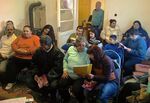What does it mean to be a Methodist in Slovakia?

Thanks to donations from all over Europe the Fund for Mission in Europe was able to help strengthening the identity and the witness of the United Methodist Church in Slovakia.
Methodist presence in Slovakia dates back to 1924, when Czech-speaking missionaries start-ed to primarily work among Czechs living there. However, it went through turbulent times of the European 20th century. In the times of the Nazi supported clerical fascist Slovak State (1939-1945), the Methodist Church was dismissed and preachers were expelled from the country. The after-war period with more freedom lasted till 1948 only. Then communist ruled Czechoslovakia gave no real chance for the development of Methodism in Slovakia either. It was only after the «Velvet revolution» in 1989 that the church could develop freely. And it did. Lots of evangelistic effort led to the formation of a few new viable congregations. People came to faith in Christ and joined these churches. Their number exceeded the one of those with Methodist background. As a result, most of the members, especially those in emerging churches, had low awareness of Methodist doctrine.
Against this background, the church leadership decided to provide Methodist doctrinal sup-port for emerging congregations – and by approving the project, the Fund for Mission in Eu-rope has helped to make a difference for the denomination in Slovakia. Congregations in Bratislava, Sereď, Gerlachov, Partizánske, Michalovce, Jenkovce, Slavkovce, and Kráľovský Chlmec were given help in doctrinal orientation of the people. And people greatly responded at the seminars in these churches. They live in an ecumenical environment with various doc-trinal emphases (Roman Catholic, Orthodox, Lutheran, Reformed, Pentecostal…). A firm Methodist ground helps them to feel more secure. Their salvation is lived in a denomination that has its teaching rooted in the Bible and in a history of revival. That gives more enthusi-asm and a sound pride in their local situations.
The seminars involved some of the teachings typical for Methodist doctrine. Special hand-outs helped people to follow and discuss during the seminars and to get back to it later at home or in ongoing discussions. The material was elaborated into 8 teaching hours and pre-sented with the use of media presentation tools. In some churches the lecturer Prof. Dr. Pavel Procházka provided all these teachings in person, in others he made an extensive in-troduction for interested lay people, while the local pastor continued working with the ma-terial in following Bible studies. The teaching was well accepted. Over 200 people took part in the seminars in Slovakia; additional people are using the printed material left in the churches (1000 copies). Incidentally, the project has overlapped Slovakia. At a visit of Prof. Procházka to Kisač, Serbia, he held this seminar also for the Slovak Methodist minority living in this country. According to the words of Superintendent Ana Palik-Kunčak, some of the participants were happy to «finally participate in a program that is designed for them».
A touching experience was a seminar held in Kráľovský Chlmec. There is a new UMC congre-gation made up of quite poor people. They struggle with Slovak language as their mother tongue is Hungarian. The seminar had to be simultaneously translated. At the end of the seminar we realized that these people are in need of Bibles in Hungarian. On our return we encouraged the congregations in Bratislava and Partizánske to buy these Bibles for them. Their response was wonderful. They raised money for Bibles – and two weeks after the sem-inar people of Kráľovský Chlmec could read the Word of God in their mother tongue.
Source: Superintendent Dr. Pavel Procházka
Date: February 3, 2014
